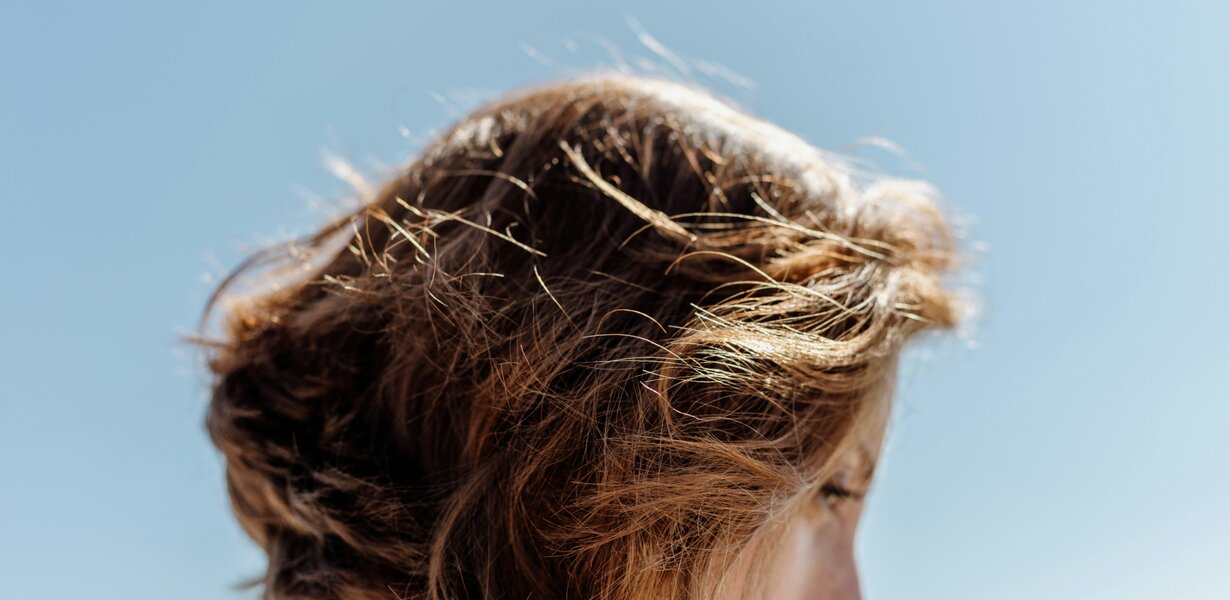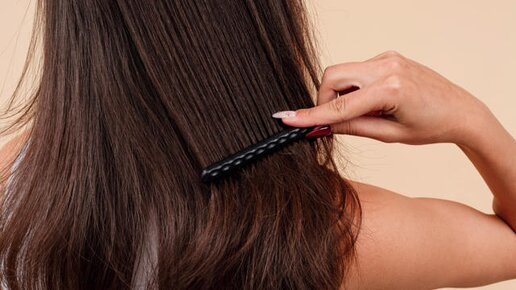They protect your skin, regulate your body temperature and grow up to 0.5 mm every day. Your hair. But whether you have a long mane or a short sidecut, hair is also a way of expressing our individual personality. The ultimate goal for many is healthy, full hair. What does it take to achieve this? Not only the right lifestyle and gentle care, but also the right genes. And then there are a few helpers that can make all the difference. One of them is called folic acid. We'll tell you why folic acid can be a game changer for your hair, what effects this vital substance has and what happens when you have a folic acid deficiency.
Folic acid: a powerful vitamin
Folic acid. Sounds pretty chemical, doesn't it? But don't worry, it's not an artificially produced pill whose exact ingredients you don't know, but a water-soluble vitamin. That's why folic acid is sometimes also known as vitamin B9, vitamin B11 or vitamin M. And this vital substance has a lot to offer, because folic acid shows its benefits wherever growth and regeneration are involved. It ensures smooth cell division and regeneration, contributes to normal blood formation and a well-functioning immune system. This vitamin can also support your mental health, not only making you feel fresher, but also helping you sleep better.
Why folic acid is good for your hair
And now to the core of the matter: folic acid can also have a positive effect on your hair health. These are the super weapons of this vitamin:
- Stimulates hair growth: The vitamin can make your hair grow faster by improving the function of the hair follicles, stimulating the production of new cells and optimising nutrient distribution.
- Increases hair volume: If more hair grows on your head due to optimal conditions, you will benefit from more volume sooner or later.
- Supports keratin synthesis: Folic acid plays a crucial role in the synthesis of keratin. This is the most important protein for hair, as it not only strengthens it but also gives it shine.
- Prevents hair loss: A healthy scalp and robust hair are the best prerequisites for counteracting hair loss. Folic acid can therefore also help you to get this problem under control.
- Reduces grey hair: Folic acid stimulates the cells responsible for the production of melanin. This is the vital substance that gives your hair its colour. This little helper can therefore slow down the signs of ageing to a certain extent.
Folic acid deficiency and its effects on hair
Sounds promising, doesn't it? Well, there's a catch: your body cannot produce folic acid itself – you have to get it from food. This is important because if your body doesn't have enough of this essential vitamin, it can lead to various health problems. Specifically for your hair, a folic acid deficiency means that, in the worst case, your hair becomes thinner or more brittle and loses its shine. It can also lead to premature greying because your body lacks essential melanin. And you risk losing more hair than normal.
Supplementing folic acid for hair
In addition to a balanced diet, you can support your body with high-quality dietary supplements. Ideally, you should take the vitamin with a little liquid, either on an empty stomach or with a meal. And how much should you take? The German Nutrition Society (DGE) recommends 300 µg daily for adults aged 13 and over.
However, folic acid is just one of many that can help you achieve stronger, shinier and fuller hair. You should also take a closer look at these other vitamins and nutrients to promote hair growth and slow down hair loss:
- Biotin (vitamin B8): This vital substance serves as a building block for the hair protein keratin, stimulates growth and promotes the formation of healthy hair follicles.
- Other vitamins in the vitamin B complex (B2, B5, B7, B12): The entire vitamin B complex is so beneficial for you because these vitamins support your hair roots, improve the supply of nutrients to your scalp, stimulate cell regeneration, contribute to the formation of keratin, have a positive effect on sebum production and promote blood circulation.
- Vitamin A: You need this vitamin because it promotes hair growth, supports the production of natural sebum, moisturises the scalp and hair, and is important for the formation of collagen.
- Vitamin C: As an antioxidant, vitamin C fights free radicals that can damage your hair structure. It also promotes collagen formation and improves iron absorption.
- Vitamin E: Vitamin E is another antioxidant. This vital substance also protects and strengthens your hair, promotes healthy growth, provides the scalp with sufficient moisture and stimulates blood circulation.
- Iron: You should also make sure you get enough iron – this trace element is essential for healthy hair growth as it improves the oxygen supply to the hair follicles, which are responsible for cell division and the formation of new hair.
- Zinc: And then there's zinc. This vital substance is also involved in the formation of keratin, thereby promoting cell division and hair growth, neutralising free radicals, regulating sebaceous gland function and ensuring healthy cell regeneration.
Conclusion: Reaching your goal with little accomplices
Many people dream of having beautiful hair. But factors such as stress, poor nutrition or unfavourable genes can get in the way. It's true that some things you simply can't change – your DNA, for example. But other things can definitely be changed. And suddenly your hair will shine again. If you want to give your hair a health boost, you should pay attention to folic acid. This little helper can help you strengthen and fortify your hair. It is found in some foods, and you can also take dietary supplements to support this.
Frequently asked questions about folic acid for hair:
Yes, folic acid can be good for your hair. This is because the vitamin plays an important role in cell division and regeneration of hair cells, which is essential for healthy hair growth and strengthening existing hair follicles. A lack of folic acid can lead to thin, brittle hair and hair loss. Folic acid also plays an essential role in the synthesis of keratin, a protein that strengthens hair and gives it shine. Because a healthy scalp and robust hair are the best conditions for counteracting hair loss, folic acid can also help with this problem. In addition, folic acid stimulates the cells responsible for the production of melanin. This means that you can sometimes prevent premature greying.
There is no specific daily dose of folic acid recommended for the treatment of hair loss, as the intake depends on the cause of the hair loss. It is therefore advisable to consult a medical professional beforehand.
No, an excessive intake of folic acid does not cause hair loss, but conversely, a deficiency of this important vitamin can cause you to lose more hair than normal. The reason: folic acid plays an important role in your body for cell division and hair growth.
Sources:
Almohanna HM, Ahmed AA, Tsatalis JP, Tosti A. The Role of Vitamins and Minerals in Hair Loss: A Review. Dermatol Ther (Heidelb). 2019 Mar;9(1):51-70. doi: 10.1007/s13555-018-0278-6. Epub 2018 Dec 13. PMID: 30547302; PMCID: PMC6380979. https://pubmed.ncbi.nlm.nih.gov/30547302/
Rah YC, Park S, Koun S, Park HC, Choi J. In vivo assay of the ethanol-induced embryonic hair cell loss and the protective role of the retinoic and folic acid in zebrafish larvae (Danio rerio). Alcohol. 2019 Mar;75:113-121. doi: 10.1016/j.alcohol.2018.07.008. Epub 2018 Jul 24. PMID: 30640074. https://pubmed.ncbi.nlm.nih.gov/30640074/
Bouvet A, Baird JD, Basrur PK. Folic acid therapy for alopecia in a Charolais calf. Vet Rec. 1988 Nov 19;123(21):533-6. doi: 10.1136/vr.123.21.533. PMID: 3206804. https://pubmed.ncbi.nlm.nih.gov/3206804/
Zorn NE, Smith JT. A relationship between vitamin B12, folic acid, ascorbic acid, and mercury uptake and methylation. Life Sci. 1990;47(2):167-73. doi: 10.1016/0024-3205(90)90230-o. PMID: 2388525. https://pubmed.ncbi.nlm.nih.gov/2388525/









